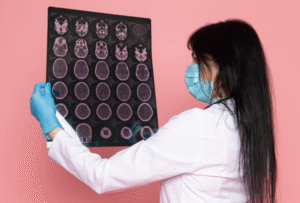Overview
Parkinsonism refers to a group of neurological disorders that cause movement abnormalities similar to those found in Parkinson’s disease. These symptoms typically include tremors, slow movement (bradykinesia), stiffness (rigidity), and balance problems. While Parkinson’s disease is the most well-known form, other types of parkinsonism exist, often with different causes and responses to treatment.
Correct diagnosis and tailored therapy are essential, especially since some types of parkinsonism may not respond well to traditional Parkinson’s medications. South Korea provides advanced diagnostics and multidisciplinary treatment options for patients suffering from parkinsonian disorders.
What is Parkinsonism?
Parkinsonism is not a single disease but rather a syndrome—a collection of symptoms—that affect motor function due to reduced dopamine levels or dysfunction in the basal ganglia (a brain region that controls movement).
The main types of parkinsonism include:
- Idiopathic Parkinson’s Disease (PD)
- Atypical Parkinsonism (e.g., Multiple System Atrophy, Progressive Supranuclear Palsy, Corticobasal Degeneration)
- Secondary Parkinsonism (caused by medications, toxins, strokes, or infections)
- Genetic Parkinsonism (hereditary conditions)
Distinguishing among these types is crucial, as treatment and prognosis can vary significantly.
Symptoms
The symptoms of parkinsonism typically resemble those of Parkinson’s disease but may vary depending on the specific type:
- Tremors, especially at rest
- Bradykinesia (slowness of movement)
- Muscle stiffness or rigidity
- Impaired balance and frequent falls
- Shuffling gait or freezing of gait
- Speech and writing changes
- Facial masking (reduced facial expression)
- Cognitive decline (in some forms of atypical parkinsonism)
- Autonomic symptoms (e.g., low blood pressure, urinary issues)
Some types progress more rapidly than classic Parkinson’s disease and may involve more pronounced mental or autonomic symptoms.
Causes
The causes of parkinsonism vary depending on the type:
- Neurodegeneration (as in Parkinson’s disease or atypical forms)
- Medication-induced (e.g., antipsychotics, anti-nausea drugs)
- Brain injuries or strokes
- Toxins or heavy metal exposure
- Viral encephalitis or brain infections
- Genetic mutations (e.g., LRRK2, PARK genes)
- Brain tumors or hydrocephalus
Identifying the cause helps guide treatment—especially in reversible cases like drug-induced parkinsonism.
Risk Factors
The likelihood of developing parkinsonism increases with:
- Advanced age (especially over 60)
- Family history of Parkinson’s disease or similar disorders
- Long-term use of dopamine-blocking medications
- History of brain trauma or strokes
- Exposure to pesticides, carbon monoxide, or manganese
- Male gender (slightly higher risk than females)
Understanding risk factors can assist in early recognition and prevention efforts.
Complications
If not properly managed, parkinsonism can lead to significant complications:
- Frequent falls and injury due to poor balance
- Aspiration pneumonia from swallowing difficulties
- Severe depression or anxiety
- Cognitive impairment or dementia
- Sleep disturbances and fatigue
- Loss of independence in daily activities
- Social withdrawal and reduced quality of life
Early diagnosis and intervention help minimize long-term impact.
Prevention
While not all forms of parkinsonism are preventable, the following steps may reduce risk or severity:
- Avoid prolonged use of dopamine-blocking drugs
- Use protective headgear during activities that could cause head injury
- Reduce exposure to environmental toxins (pesticides, heavy metals)
- Manage cardiovascular health to prevent strokes
- Exercise regularly to maintain brain and motor function
- Get prompt treatment for neurological infections or injuries
Genetic counseling may be helpful if there is a strong family history.
Treatment Options in Korea
South Korea offers advanced, world-class medical care for patients with Parkinson’s disease and other forms of parkinsonism. Treatments are often customized based on the type and progression of the condition.
1. Diagnostic Services
- DaTscan (dopamine transporter imaging) to distinguish types of parkinsonism
- MRI and CT scans to identify strokes or structural abnormalities
- Neurological assessments by specialists in movement disorders
- Genetic testing in familial cases
2. Medical Management
- Levodopa/carbidopa: Most effective for classic Parkinson’s disease
- Dopamine agonists, MAO-B inhibitors, or COMT inhibitors
- Symptomatic treatment for tremors, stiffness, and depression
- Atypical parkinsonism may require non-dopaminergic medications and supportive care
3. Surgical Interventions
- Deep Brain Stimulation (DBS): Used for patients with Parkinson’s disease who respond to levodopa but suffer from motor fluctuations
- DBS is less commonly used for atypical parkinsonism but may still benefit selected patients
4. Rehabilitation Therapy
- Physical therapy to improve gait and balance
- Occupational therapy to maintain daily function
- Speech and swallowing therapy
- Cognitive and behavioral support
5. Holistic and Supportive Services
- Nutritional counseling for proper dietary support
- Psychological counseling to address emotional health
- Caregiver support and education
6. Top Hospitals in Korea for Parkinsonism Care
- Severance Hospital, Seoul
- Samsung Medical Center, Seoul
- Asan Medical Center, Seoul
- Seoul National University Hospital (SNUH)
These hospitals offer English-speaking staff, international patient support programs, and the latest in diagnostics, medical therapies, and research participation for parkinsonian disorders.













